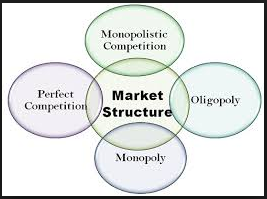What is Market and its Structures in Economics?
Here Information provide help us to know about What is Market and Market Structures in economics in detailed.

Do you have similar website/ Product?
Show in this page just for only
$2 (for a month)

0/60
0/180
What is Market and its Structures in Economics?
Meaning of Market:
In simple language, 'market' refers to a place where a certain commodity is being sold and bought, like cloth market, vegetable market, etc. are examples of Market.
In Economics, the term 'market' has a technical meaning and point of view. It does not refer to a specific place. Market is an organisation whereby buyers are brought in contact with the sellers. It is not necessary that they should meet at a given place. They may establish contact over telephone and a market comes into existence. Thus market is extended through facilities like middlemen, representatives, post, telephone, telegrams, fax and internet, etc.
Modern economy is complex in nature. There is division of labour and specialisation to a great extent. No one is self-sufficient in the sense that he can produce everything he wants. He produces for a market. It is very necessary and important to have such an organisation to facilitate trade and commerce.
Thus, market is an very important institution, more so in free enterprise economy.
Now we will understand about Market Structures in detailed-
Markets can be classified on the basis of the degree of the competition as follows:-
- Perfect Competition:- Perfect competition exist when the following conditions are fulfilled.
- Large Number of Buyers and Sellers- In a perfect market there is an extremely large number of buyers and sellers. Each buyer or seller controls a very insignificant portion of the total purchase or sale. He is a drop in the ocean. He can't influence market conditions.
- Homogeneous Product- Under Perfect competition, sellers are selling identical commodities. There is no difference whatsoever in the commodity sold by one seller and the other. Commodities seems to be perfect substitutes of each other. If wheat is sold, it is of the same quality.
- Perfect Knowledge- Every seller and buyer has perfect knowledge of the market conditions. He knows about the price and the quality of the product. There is no need for advertisement.
- Perfect Mobility- Factors of production are mobile, means that they can freely move from low paid to better paid occupations. New firms can move into the industry and old firms leave the industry. No artificial restriction on movement.
- Monopoly:- It is exact opposite of perfectly competitive market. Monopoly means a situation in which there is a single seller of the product. It therefore means absense of competition. Perfect monopoly can exist only when there is no substitute for the commodity sold by a single seller. In Economics, monopoly means a market situation in which there are no close substitutes available for the commodity sold. Monopoly firm or seller has control over his sale. He has control over his price also. But a monopolist cannot have control over both price and sale. He can determine either price or sale.
- Imperfect Competition:- Imperfect Competition known as Monopolistic Competition. Real world market situations are those of imperfect competition.
- Many Sellers and Buyers- There are many sellers competing with each other and also many buyers, No seller is in a position to influence the price.
- Product Differentiation- Under monopolistic competition, each firm or seller is selling a product which is very much similar to the product sold by another seller. But it is not identical. Difference types of tooth pastes, radios, cloth etc are examples of product differentiation.
- Selling Costs- Sellers try to influence the preferences of the customers by advertising for their products. Thus, selling costs are incurred. There are no selling costs under perfect competition or monopoly. Here, Products are differentiated by selling costs.
- Absence of Perfect Knowledge- There is no perfect knowledge about the quality of the product, etc.
- Free Entry- Firms are free to enter the industry and leave it as they like.
- Oligopoly:- It is also again a real world market situation. In Western countries today and even in India, we find that very few firms, say 3 or 5 are controlling virtually the whole market in certain commodities. Under oligopoly there are more than two but less than many firms in an industry. Motor car industry in India, is an example of oligopoly.
CONTINUE READING
Economics- Perfect Competition- Market and Market Structures.
Kinnari
Tech writer at NewsandStory
